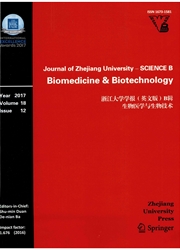

 中文摘要:
中文摘要:
尽管 parasitoid 主人相互作用的生物化学的解剖正在变得很好描绘了,有关他们的分子的知识是最小的。为了理解对 parasitoid 的主人免疫者反应的分子的基地,攻击,我们探索了 Papilio xuthus 的反应用 proteomic 由 endoparasitic 黄蜂 Pteromalus 小狗海芋属植物寄生于途径。由检验血浆蛋白质的微分表达式在寄生于并且 unparasitized 主机蛹由二维(2D ) 电气泳动, 16 蛋白质被发现与 unparasitized 控制样品相比在与 parasitization 的关系变化。所有被结合的集体 spectrometry 他们提交到鉴定数据库搜索。调制蛋白质被发现掉进下列功能的组:体液或细胞的免疫, detoxification,精力新陈代谢,和其它。这研究贡献卓见进在 parasitoids 和他们的主人昆虫之间的关系的分子的机制。
 英文摘要:
英文摘要:
Although the biochemical dissection of parasitoid-host interactions is becoming well characterized, the molecular knowledge concerning them is minimal. In order to understand the molecular bases of the host immune response to parasitoid attack, we explored the response of Papilio xuthus parasitized by the endoparasitic wasp Pteromalus puparum using proteomic approach. By examining the differential expression of plasma proteins in the parasitized and unparasitized host pupae by two-dimensional (2D) electrophoresis, 16 proteins were found to vary in relation to parasitization compared with unparasitized control samples. All of them were submitted to identification by mass spectrometry coupled with a database search. The modulated proteins were found to fall into the following functional groups: humoral or cellular immunity, detoxification, energy metabolism, and others. This study contributes insights into the molecular mechanism of the relationships between parasitoids and their host insects.
 同期刊论文项目
同期刊论文项目
 同项目期刊论文
同项目期刊论文
 A heat shock cognate 70 gene in the endoparasitoid, Pteromalus puparum, and its expression in relati
A heat shock cognate 70 gene in the endoparasitoid, Pteromalus puparum, and its expression in relati Morphology and ultrastructure of the venom apparatus in the endoparasitic wasp Pteromalus puparum (H
Morphology and ultrastructure of the venom apparatus in the endoparasitic wasp Pteromalus puparum (H Venom of Pteromalus puparum (Hymenoptera: Pteromalidae) Induced Endocrine Changes in the Hemolymph o
Venom of Pteromalus puparum (Hymenoptera: Pteromalidae) Induced Endocrine Changes in the Hemolymph o cDNA of an arylphorin-type storage protein gene from Pieris rapae with parasitism inducible expressi
cDNA of an arylphorin-type storage protein gene from Pieris rapae with parasitism inducible expressi Molecular cloning and characterization of acid phosphatase in venom of the endoparasitoid wasp Ptero
Molecular cloning and characterization of acid phosphatase in venom of the endoparasitoid wasp Ptero 期刊信息
期刊信息
